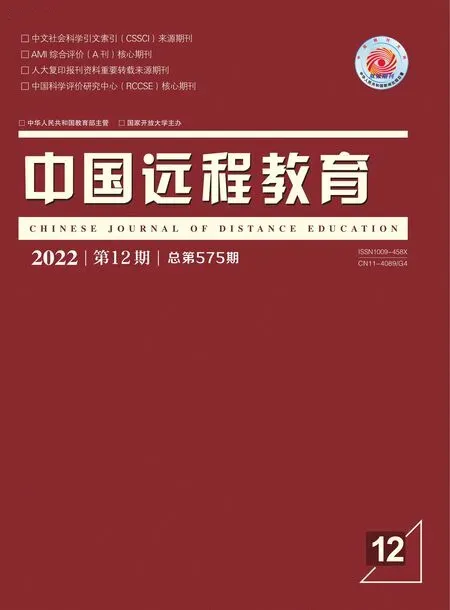Abstracts
2023-01-25
Key research projects in education sciences in China in the 21st century:progress,trends and reflections
Zhentian Liu and Yu Xiao
Key research projects in philosophy and social sciences sponsored by the Chinese Ministry of Education are aimed at solving macro-level,forward-looking,and strategic issues of theoretical and practical importance emerging in national economic construction and social development,with their focus on basic research and cutting-edge research issues.Therefore,they play a seminal role in the development of education sciences.This article analyzes the key projects in education sciences funded in the first two decades of the 21st century(2003-2021)and their published outcomes in terms of researchers and affiliations,research topics,research types and development trends.Findings indicate that the majority of Principal Investigators hold administrative positions and that their affiliations,mainly“double first-class”normal universities and other universities with a strength in education sciences,are unevenly distributed.It is also found that these projects concentrate on the core issues of education,including talent cultivation objectives,pathways,and evaluation.Furthermore,they tend to be characterized by applied research,in line with national policies and educational equity and have experienced a shift from macro-level research to micro-level research,from speculative research to empirical research,and from independent research to cooperative research.Implications of this study are also discussed.
Keywords:Key Research Projects of the Ministry of Education;education sciences;“double first-class”;talent cultivation;high-quality education system
A review of intercultural education
Baocun Liu and Minghan Gou
Intercultural education is a result of increasing cultural diversity in the era of globalization,deepening democratization of education,and declining multiculturalism.Intercultural education was rooted in the "foreigner education" of European countries in the 1960s,and spread to other parts of the world due to active advocacy of international organizations such as UNESCO in the 1990s,producing a profound impact on education theories,practices,and the cultural form of the human society.Intercultural education takes a tolerant and open approach to cultural differences.Its basic propositions include:opposing cultural hegemonism and cultural tribalism and advocating cultural understanding and cultural symbiosis;promoting cultural integration and cultural exchange and cultivating learners' intercultural competence;strengthening curriculum design and creating intercultural learning situations;improving intercultural teaching methods and encouraging dynamic cooperation among multiple subjects;and finally optimizing the evaluation of intercultural education and choosing appropriate forms and tools of evaluation.Intercultural education transcends the one-world mentality and the alien-mindset,resolves the conflict between "national identity" and "ethnic identity",and compensates for the shortcomings of multicultural education.However,as a new ideological trend,intercultural education faces queries about its identity recognition,epistemology and methodology.
Keywords:intercultural education;intercultural competence;cultural diversity;democratization of world education;cultural differences;cultural understanding;cultural integration;cultural symbiosis
Digital technology-enabled co-governance of rural and urban compulsory education: theoretical mechanism and realization pathways
Shutao Wang and Junwei Bao
This article analyzes the theoretical mechanism of digital technology-enabled co-governance in urban and rural compulsory education from the value perspective of this co-governance and in light of the Barnard social collaboration theory,finding that the flow of information resources in urban and rural compulsory education generated by digital technology-enabled co-governance is fundamental to achieving co-governance and generating the willingness to collaborate.It is argued that the organic unification of the governance purpose of integration and personalized development of urban and rural compulsory education is the prerequisite for co-governance.The organic unification of the three is necessary to build a systemic and collaborative educational governance system.The article also discusses strategies for future development.Put specifically,co-governance should be based on "integrated" top-level design,with multiple digital technology combinations linking the information flow channels of co-governance,emphasize the complementary mutual facilitation of heterogeneity,with different players collaborating equally to remove barriers to co-governance, and promote "community" synergy upgrading, fostering co-governance ethos through co-development with each other’s concerns in mind.
Keywords:digital technology empowerment; educational co-governance; educational integration; educational community; urban-rural compulsory education; collaborative system; theoretical mechanisms; realization pathway
Assessing critical thinking about real-world problems:status quo and challenges
Liming Jiang,Yujie Liu and Fang Luo
In the 21st century of information explosion and rapid development in artificial intelligence technology,critical thinking is gaining increasing attention as an essential quality for individual survival and development.Accurate and effective assessment is an important foundation for critical thinking education.The traditional critical thinking test is mainly in the form of abstract objective questions,which results in low ecological validity and lack of overall evaluation.In recent years,researchers have been trying to use realworld problems as test scenarios and material-based argumentative writing as the test form to predict students'critical thinking performance in the real world.This new type of assessment can make up for the shortcomings of traditional test and evaluate the entire process of critical thinking from input to output.To enable large-scale application of the new assessment,researchers need to improve the reliability and validity of the assessment,complete the automatic scoring of argument writing with the help of natural language processing technology,obtain multiple process data and realize process evaluation,and promote personalized teaching with intelligent assessment.To this end,the deep integration of psychometric technology and artificial intelligence technology is required.
Keywords:critical thinking;real-world problem assessment;intelligent assessment;psychometrics;higher order thinking skills;argument writing test
